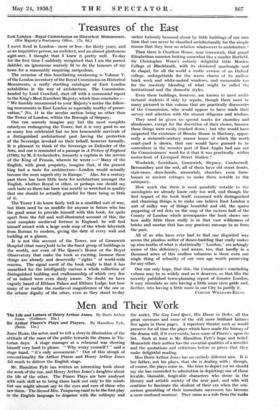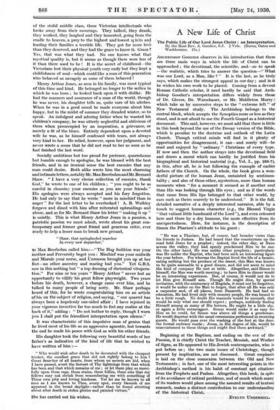Men and Their Work Sir Arthur Pinero's Plays and Players.
By Hamilton Fyfe. (Bonn. 15s.) 3onx HARE, the actor, used to tell a story in illustration of the attitude of the mass of the public towards the drama in Vic- torian days. A stage manager at a rehearsal was showing himself very hard to please. " Why worry yourself ? " said a stage hand; "-it's only amusement." Out of this slough of conventionality Sir Arthur Pinero -and Henry Arthur Jones did much to deliver the English stage.
Mr. Hamilton Fyfe has written an interesting book about the work of the one,-and Henry Atthur Jones's daughter about the life of the other. The Pinero Plays are here analysed with-such skill as to bring them back not only to the minds but one-Might ,almost- say- to the-eyes and ears of those who saw theirl,. The Second Mrs. Tanqueray (said to-be-thelltst-play in the. English language to dispense with the-soliloquy and
the aside), The Gay Lord Queal, His House in Order, all the great successes and some of the still more brilliant failures live again in these pages. A repertory theatre such as would preserve for all time the plays which have made the history of the drama will; if it ever exists, have some of Pinero's upon its - list. Such at least is Mr. Hamilton Fyfe's hope and belief. Meanwhile their author has the essential qualities of a novelist and the quotations and criticisms before us prove that they make delightful reading: "
Miss Doris Arthur Jones has an entirely different aim. It is her father, not his plays, that' she is dealing with ; though, of course, thePlayi come in. She tries to depict (or we should say she has succeeded to .admiratiOri in depicting) one of thoie lovable,- blamable, forgivable characters who shone in the literary and attistfc society- ofthe near paSt,- and *kb Will continue to fascinate the student of their era when the ceiil sorious grumbling of their immediate successors has beconte a mere Confused 'murmur. They came as a -ride from thi tanini
of the stolid middle class, these Victorian intellectuals who broke away from their moorings. They talked, they drank, they worked, they laughed and they lamented, going from the 'cradle to heaven, a prey to the highest and:lowest sr irls and leading their families a terrible life. They got far more lov; than they deserved, and they had the grace to know it. Grace ? Yes, that was what they had. No one knows what that tnystical 'quality is, but it seems as though there were less of it than there used to be ! It is the secret of childhoodthe Victorians lost their physical youth very early but they kept a childishness of soul—which could like a man of this generation Who behaved as savagely as some Of them behaved !
Henry Arthur Jones, as seen in his 'family, was most typical of this time -and kind. He belonged no longer to the milieU in Which he was born ; he looked back upon it with dislike': He
had the manners and assurance Of a man of the World, though he was never, his daughter tells us, quite sure of his aitches.
When he was in a good Mood he made everyone about him happy, but in the midst of summer they dreaded winter, so to -speak. An indulgent and adoring father when he *anted:hit
Children'a company, he was utterly neglectful and obliviouS of them when preoccupied by an inspiration, a grievance, or merely a fit of the blues. Entirely dependent upon a devoted wife he was, as he himself confessed with tears, not always very kind to her He relied, however, upon her judgment, and never Wrote a scene that he did not read to her as soon as he had finished the last word. -
Socially ambitious but too proud for pretence, quarrelsome but humble enough to apologize, he was blessed with the best friends, and in no ironical sense the best enemies that any
man could desire. Both alike wrote him the most charming and intimate letters, notablyMr. Max Beerbohm and Mr.Bernani. Shaw. ." I have a very choice collection of enemies, thank God," he wrote to one of his children ; " you ought to be as careful in choosing your enemies as you are your friends." His apologies were always accepted and his fury forgotten. He had only to say that he wrote " more in mischief than in anger 7 for the last letter to be overlooked ! A. B. Walkley forgave and dined with him after reiterated upbraidings and abuse, and as for Mr. Bernard Shaw his letter-" making it up "
is saintly. This is what Henry Arthur Jones in a passion, a patriotic passion we must admit, wrote about his great con- temporary and former great friend and generous critic, ever ready to help a lesser man to break new ground,
" Shaw, that springheeled marcher In.every new deparcher," as Max Beerbohm called him:—" The Hag Sedition was your
Mother and Perveisity begot you : Mischief was your midwife •
and e your nurse, and Unreason brought yon up-at her feet—Ino other ancestry and rearing had you." Yet G.B.S. saw in this nothing but " a top dressing of rhetoricidvitutiera- tion." For nine or ten years " Henry Arthur " never lost an opportunity to villify his great fellow playwright. Two years before his death, however, a change_ came over him, and he talked to many people of being sorry. Mr. Slut* PerhipS beard of this, for he wrote congratulating him on an article of his on the subject-of religion, and saying, ." our quarrel has always been a hopeleasly one-sided affair ; I have rejoiced in your vigorous invective far too much to feel any malice at the' back of it," adding : " Do not bother to reply, though I warn you I shall put the friendliest interpretation upon silence."
It was characteristic of this impulsive man of genius that he lived most of his life as an aggressive agnostic, but towards the end he made his peace with .God as with his other friends; His daughter took the following very beautiful words of her father's as indicative of the kind of life that he wished to have written of hiin
" Who would wish after death to be decorated with the cheapest trinket, the smallest grace that did not rightly belong to him ? Great Searcher of all hearts, from whom no secrets are hid, when I have passed, avert the fiercest of Thy lightnings from that which has been and that which remains of me ; or let them play so merci- fully upon these rags, these stains, these follies, these sins that my fellows may not shrink from remembering me with something of Thine own pity and loving kindness. Yet let me be known to all men as I am known to Thee, every spot, every blemish of me apparent in the broad daylight—rather than be found strutting about after death in stolen glories and painted virtues."
She has carried out his wishes.







































 Previous page
Previous page